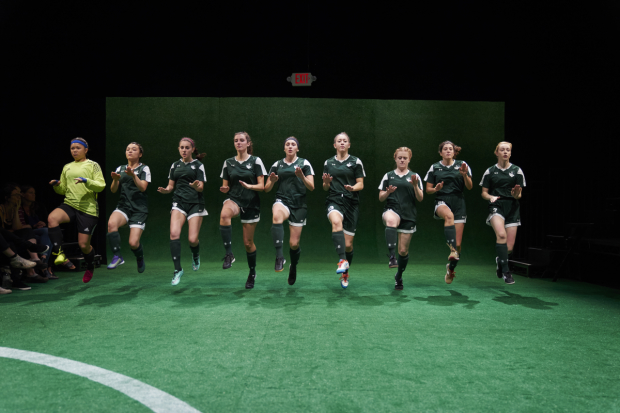The Wolves

(© Daniel J. Vasquez)
Earlier this year, Danai Gurira's drama Eclipsed made history as the first play on Broadway ever to feature an all-female playwright, director, and cast. Ushered in with less pomp and circumstance, the Playwrights Realm production of The Wolves boasts the same achievement off-Broadway at the Duke on 42nd Street — though instead of war-torn Liberia, the play is set on an empty patch of Astroturf in Middle America where the members of playwright Sarah DeLappe's all-girls indoor soccer team warm up their bodies and mouths before every game.
Carefully choreographed by director Lila Neugebauer, DeLappe's episodic observations of teenage athletes is much less explicit in its "girl-power" message than Gurira's story of women fighting their way through the Liberian Civil War of the early 1990s. Such horrific stories would likely be completely foreign to DeLappe's sheltered middle-class characters, who instead draw their opinions on global events from textbooks and sound bites picked up from their parents. Sitting around a stretch circle, they hypothetically debate things like the Khmer Rouge of Cambodia, only to transition moments later into a conversation on feminine products as they playfully ridicule a prudish teammate who's sworn off tampons.
It's the typical banter of adolescent girls, alternating between mindless gossip and attempts at intellectual heft. Even so, DeLappe never makes fun of her young Wolves (blessedly not called the "She-Wolves" or "Lady Wolves," as female athletic teams are wont to name themselves). Instead, her dialogue adeptly mines the profundity out of these trivial exchanges — pinpointing what makes even the most inane thoughts and experiences feel so powerful when you're 17 and just gleaning what it means to become an adult.
Equally impressive is how DeLappe gets us well-acquainted with all nine of the girls on the team (most of whom remain nameless for the majority of the show), played by a roster of excellent actresses from top to bottom. Lauren Patten spouts motivational adages as team captain (#25), whom we also see grow comfortable with her unspoken homosexuality through a relationship she develops off the field. Midori Francis (#8) plays the resident optimist who, with an adorable soft-spoken manner, cries at the drop of a hat. Jenna Dioguardi (#13) is the effortlessly cool jokester with magical abilities to throw her hair in a perfect high pony tail.
Sarah Mezzanotte (#2) portrays a sweet conservative Christian who secretly struggles with a few private demons. Susannah Perkins (#11) is the levelheaded one of the group who also enjoys pushing intellectual boundaries (posing some of the most intriguing questions during the Khmer Rouge conversation). Lizzy Jutila (#00) remains silent for the majority of the play as the talented but tightly wound goalie (though she proves her emotional and athletic range in a solo moment of onstage explosion). Tedra Millan (#46) is the quirky new girl with mysteriously unexplained talent and a hazy family background. And Brenna Coates (#7) fills the mean-girl slot as the team's foulmouthed star whose only close friendship is with her designated sidekick #14 (played by Samia Finnerty), whose role has become tagging along on her outspoken pal's misadventures.
The audience sits in bleacher seats on opposite sides of set designer Laura Jellinek's field (lit by Lap Chi Chu, with environmental sound design by Beth Lake for the scene transitions), offering as close to an immersive experience of the increasingly complicated team dynamic as the theatrical setting allows. Relatively little plot unfolds over the series of warm-up sessions we witness from the stands, and yet we become engrossed with the relationships that grow clearer as we spend more time with this tightly knit group of girls. It's a picture of female camaraderie in its most authentic form, which inevitably includes moments of jealousy and betrayal in addition to the foundation of love and support.
Most heartening of all is that DeLappe has created an ensemble of distinct female characters without leaning on romantic partners or traditional feminine tropes to define them. All donning designer Ásta Bennie Hostetter's androgynous dark-green uniforms, there's no way to know what each of these athletes looks like as she walks down the school hallway each day. Only the most telling pieces of character can shine through this blank slate — and as DeLappe proves through her fierce pack of wolves, these are the subtle ingredients that keep us rapt.










